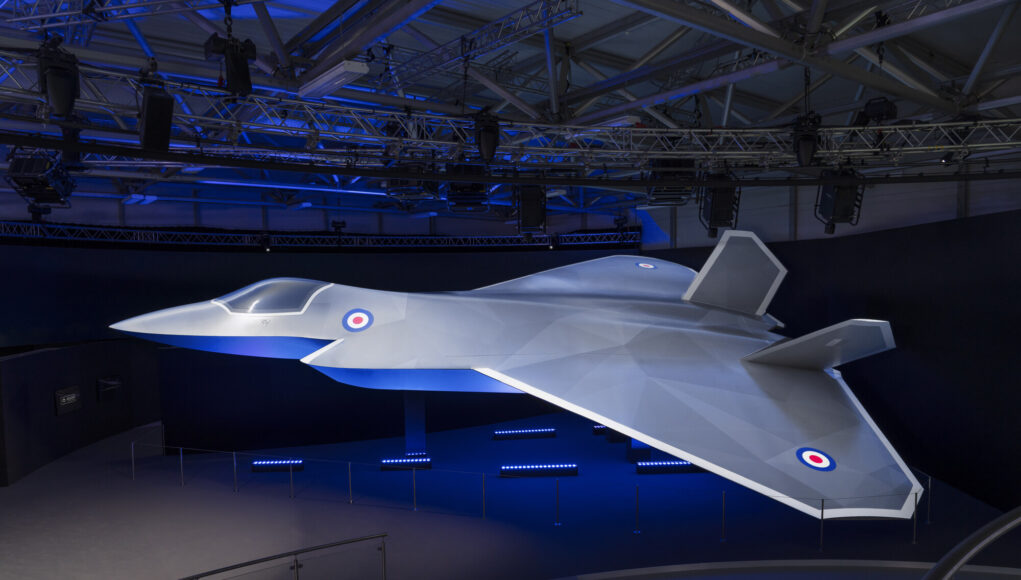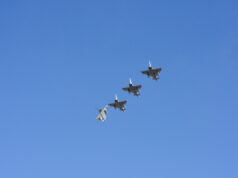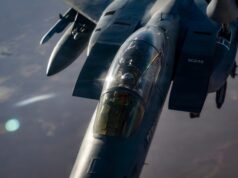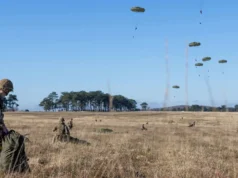The Ministry of Defence (MoD) has recently clarified that a £160 million reduction in projected in-year expenditure for the Future Combat Air System (FCAS) and Global Combat Air Programme (GCAP) is not a reflection of scaling back military capability or commitment to the programme.
Responding to parliamentary queries from Conservative MP James Cartlidge, Defence Minister Maria Eagle explained that the underspend results from various factors, including shifts in accounting treatment and early progress on the combat aircraft demonstrator project.
“The reduced in year expenditure is not a result of changes to the military capability being developed by the FCAS/GCAP programme,†Eagle stated. “It is a combination of an accounting treatment change, work on the combat aircraft demonstrator project that was carried out ahead of schedule in the previous financial year and revised plans for the delivery of infrastructure and other programme enablers.â€
Britain starts manufacturing on new fighter jet demonstrator
The clarification came after Cartlidge questioned whether the MoD’s reduction signalled a downgrading of the ambitious project at a time when defence budgets are under close scrutiny. The Ministry previously indicated that while the initial budget for this financial year was set at £1.46 billion, adjustments were made to £1.3 billion in response to updated industry timelines and financial processes. This recalibration, according to MoD sources, was primarily based on industry-revised estimates of programme activity, not on a reduction in commitment or long-term funding.
Critics, however, argue that even perceived reductions in budget allocations could impact the UK’s standing with its allies, particularly in defence manufacturing collaborations. Cartlidge, who labelled the move as a “cut,†highlighted the potential for mixed signals to adversaries regarding the UK’s defence priorities.
Yet, MoD officials have maintained that the adjustments are consistent with typical project cycles and reflect an approach that allows for resource reallocation in line with project advancements and actual industry timelines.
Furthermore, the current budget still accounts for the programme’s extensive goals, which encompass developing next-generation air combat capabilities. “At the start of this financial year, it was expected that the Ministry of Defence would spend up to ~£1.46 billion on FCAS/GCAP. The forecast was reduced to £1.3 billion due to revised estimates of programme activity from industry throughout the year,†noted Eagle in her response.
The MoD has also highlighted the importance of the broader FCAS/GCAP initiative for the UK’s future military capability, explaining that project timelines, fiscal oversight, and reallocation practices are carefully aligned to ensure progress without compromising capability.
Notably, the programme is expected to see further investment and phases of development in the coming years.
What is Tempest?
The Tempest/Global Combat Air Programme (GCAP) is a collaborative project between the United Kingdom, Japan, and Italy, aimed at developing a sixth-generation stealth fighter. This aircraft is intended to replace the Eurofighter Typhoon for the Royal Air Force and Italian Air Force, as well as the Mitsubishi F-2 for Japan’s Air Self-Defense Force.
The joint programme began in December 2022, merging separate initiatives from the UK, Italy, and Japan into a single development effort for the new fighter jet.
The UK has already made significant strides in the development of GCAP, with initial test flights conducted on simulators and progress reported on key technologies like stealth features and weapon bay integration. Rolls-Royce is heavily involved in the engine development, working alongside Italian and Japanese companies to ensure compatibility and innovation in the propulsion systems.
The demonstrator aircraft, featuring advanced avionic systems, is expected to showcase cutting-edge capabilities by 2027.
While the focus of GCAP is on the fighter jet itself, future developments could include unmanned systems and other assets to support the aircraft in a “system of systems” approach. However, unlike similar programmes in Europe, GCAP remains focused primarily on the development of the fighter, leaving broader air combat capabilities as potential future projects.














Hmm, so long as the money isn’t taken away by the Treasury… traditionally underspends were taken back by the treasury so there was always a scramble to spend said underspends..! Err if you follow…
Cheers CR
Yes you would expect underspends to be re-invested to excelerate the project faster. In theory you save money at the end of a project – not half way through.
Mixed feelings here but most of the criticisms generally and on here is about overspends and wastage so if what the Minister is saying is true (and for me that is the crucial point) then for me it would be madness just to spend money for the sake of it, there have been too many incidents over the years of budgets being wasted because unused amounts would otherwise be returned and of course it might lead to underfunding so that such scenarios don’t arise.
The ideal would be such saved funding should be reserved or at least kept in mind for future circumstances where extra funding might be deemed sensible when something changes to make further investment advantagous especially where various developments can be kept in sync which might be the case here if certain developments were as they say ahead of the expected timeframe. Well let’s see if that logic does indeed happen.
Heaven forbid that the MoD have found a way to save money!?
I think this is a bit of a non story. There are plenty of other reasons to be worried about the defence budget over the next few years, but I think the Tempest program will be ok 🤞🤞 …there are too many good reasons for it not to continue…
6th of April 1965 James Callaghan. TSR 2
An aircraft that was flying and on maiden flight walked away from a Lighting with only one engine on reheat. Could only be caught by the lightning on full reheat. There have been documentaries on the subject. Many believe it would have been better than the F111.
Labour have form on cutting big defence projects on ideology not reasoning.
…and destroying the jigs and tooling so that nobody could re-start the project. Check Canadian Avro Arrow story too. USA big business skullduggery I reckon.
Well from what I remember and have researched since on TSR2 I believe the situation is considerably different.
Ok so the background. Back then Britain was truly in a terrible state still reeling from the costs of the war and the economy in a dire state. Some might say that and strikes are not dissimilar now but absolutely they are not. Our economy had a semi flourish post war because only the US were better placed to exploit the economic post war demand. We produced a large % of cars, something like 60% of the worlds motorbikes large numbers of aircraft. However this was all done with little investment due to the lack of competitors, however all those beaten down countries on the Continent and Japan were rebuilding with new technology and ideas and by the 60s we were being destroyed by these new competitors. Britain destroyed the US motorbike industry in the 50s Harley Davison only survived when they played on their old fashioned American branding, yet by the 60s in turn the Asians had destroyed our industry. So imagine the desperation politically in Britain back ten.
This led to us being at the mercy of the US, they were milking us as directly as they were dictating to us, they could dictate almost any terms and they saw themselves as the World’s leader and supplier and everyone was up for exploitation with no Queensbury rules in play.
So the Labour Govt desperate for US financial and economic support and considered by many in the US as little more than Soviet, Commie supporting cronies were pretty much blackmailed into not competing or doing pretty much anything deemed ‘anti America’ for the sake of gaining economic support and being propped up.
So to TSR2. This was part of that process. The US sabotaged the Australian deal and pretty much made it clear loans and economic support necessitated closing down TSR2 (they even played a similar though more focused game later with the Big Wing Harrier/AV8B) and making sure it could never be revived. Sadly we also sabotaged ourselves because that roving useful idiot Mountbatten (must be in the genes) was a vital villain in it too. This tool involved in his own manipulative game to maintain the navy’s pre- eminence and power base went to Australia and put the nail in the coffin of that deal, which was deemed crucial to the programme. Why? Because he wanted the Navy to hold sole control of the nuclear deterrent while wanting the navy’s Buccaneer to be forced on the RAF promising a cheaper supersonic version could be produced which would itself be beneficial to the Navy. Any chance of saving the project was thus destroyed by him talking down TSR2 even while he was supposed to be promoting British technology in Britain AND abroad. Rest is history.
As an aside the TSR2 was very much an EE inspired design (thus the Lightning story above rather ironic) sadly when the powers that be forced them into alliance with Bristol, the latter being the bigger and more influential entity it was then given design lead over the project while ironically coming up with a design remarkably similar to English Electric original. Whether this ‘distraction’ affected the overall veracity of the design and led to the problems the project did suffer along the way can only be speculated upon, but the Lightning rather showed the quality of their design department over Bristols.
Ironically I think Petter was well gone by then, but EEs design department was very much his product, but he suffered a similar scenario at Westland pre war when they were deemed too small fry to be relied upon compared to the all powerful Vickers or Hawker and thus not backed on the Whirlwind which was itself a revolutionary design at the time with teething problems.
Amazing how many aviation companies Britain had so plenty of politics when all merged, repeated in the motor industry with BL. If there had been an overseas market for tsr2 America would have seen us off with back room deals. They made Western Europe buy the flawed star fighter.
The post-war saturated state of the British aircraft industry had to be rationalised, but the cure killed the patient.
“…Mountbatten (must be in the genes) was a vital villain in it too. This tool involved in his own manipulative game to maintain the navy’s pre- eminence and power base went to Australia and put the nail in the coffin of that deal, which was deemed crucial to the programme.
Because he wanted the Navy to hold sole control of the nuclear deterrent…”
A Good job too!
A sole land based deterrent would been very valuable to a ‘first strike’, unlike the US and USSR, which had all three types of deterrent, land, air and sea,
which was completely unaffordable for the UK to undertake.
If the RAF had made a deal with the RN and conceded the deterrent(CASD), to the RN, the RAF could of had an improved Buccaneer for land tactical strike?
But why did the RAF keep on insisting on a role of future strategic strike capability as late as 1965, also knowingly the future decision of the nuclear deterrent was made at Naussau Summit in 1963, which resulted in the Polaris Sales Agreement which gave the strategic strike capability to the RN in 1968? I wondered if the RAF attempted to sabotage the P.S.A hopping a new Government would overturn Naussau?
All I would concur with. EE were certainly fantastic designers. The Olympus engine though, made the TSR2 full of potential.
I would though, also add in a bit of USA big business skullduggery too. Who knows what forces and levels of corruption/extortion were going on. The leading up the garden path of the F-111 and Skybolt missile compounded the situation.
Admittedly the big problem with the TSR2 was runway length requirement, but that was true of all non-Harrier aircraft at the time.
UK Governments then and now still do not “get” the concept that spending money on UK world-beating research, design, and production, comes back as growth in the wider economy and benefits to the British people. they would far rather chase the fast-buck, quick dream, and buy off the shelf and thereafter be in hock to another country.
If you go to Brooklands aero museum. The pathways that link the aircraft outside in the open air part of the museum. You will see loads of concrete shapes. Some are about 30cm long whilst others are up to 2m long, along with everything in between. These are the concrete formers, that were used to shape the TSR2’s alloy skin panels. There’s hundreds of them.
Really?
I’ve never noticed that in all of the times I’ve been there, even did DofE volunteering at Brooklands.
Will have a look next time I’m there, very cool info.
How did you find it out?
Along one of the pathways there’s a plaque, stating what they are. When you look again, you notice that each are different.
…dH Museum at Salisbury Hall has concrete formers for the DH Hornet as part of their rock garden!
Now there’s an aircraft to bring back.
My old ground engineer Dad (RIP) used to say that the HORNET was a git to work on. Everything was “Schnideized.” Meaning everything was the bare min/hard to get at/designed for racing to achieve its great performance and stuff anybody trying to maintain it.
UCAV?
Would make a great name for a loyal wingman, sting hard and fly fast.
Or are you talking about building a replica?
I don’t believe there’s any complete DH Hornets still around? Although I think there’s a nose and cockpit section in a museum. It would be great to see a full sized replica, even more so a flying version. There are companies that have done the same for the Mosquito. Sadly the Hornet doesn’t have the same pull/history as the Mossie. So is unlikely to get funding for such a venture.
Find a billionaire to use it for air racing?
It is a pity, especially as we haven’t used the name since and it is one of my favourite prop planes ever
Losing the Arrow will always haunt Canadians, and the way everything was destroyed left a large question mark. I believe the change in government, the cost overruns and back-room skullduggery killed it. Maybe one day we will know but what an aircraft Canada lost! Instead Canada got CIM-10 Bomarc missiles from…the USA.
RIP the Avro Arrow. Same forces at work with the TSR2.
As a long range interceptor, and just what the Canadians needed to counter threats coming in over the high Arctic. I wonder if TEMPEST could fulfil the same role now?
The great Roland Beaumont made two points regarding TSR2,
“There are four forces effecting combat aircraft, Lift, Thrust, drag and politics”
“The main advantage of the F-111 was that it wasn’t cancelled!”
As much as TSR2 fascinates me, the more I read ( just about everything over the last 40 years) the more I’ve come to accept that it was simply too expensive for the UK to develop field and operate.
We simply couldn’t afford an aircraft of its huge complexity and it would have crippled the RAF with its huge operational cost.
A reasonable place to start although not always 100 percent accurate Wiki.
If you read the TSR 2 article there, in particular the cancellation paragraph. Labour estimated the 15 year run cost of TSR at between 1000 and 1700 million which was two expensive hence the cancellation. They decided to go F111. Options were placed and cancelled within two years because the F111 was even more expensive. Labour have always made decisions on ideology not informed financial or military knowledge.
And the Buccaneer stood in and did a fine job 🇬🇧
Are you seriously considering TSR 2 or the F111 as anything remotely similar to a Buccaneer. The phrase chalk and cheese springs to mind.
No absolutely not ,but once TSR 2 & F111 were cancel the Bucc was put in this roll has a replacement for this two aircraft .After all it was a Bomber. Didn’t say in my post it looks anything like TSR 2 or F111.
You said it stood in and did a fine job. I would say we lost the capability or potential capability TSR would have brought. A cruise of plus Mach 2 impressive weapon load and range. The Buccaneer whilst fantastic at low level and many say nothing has still come close to equally matching it. With a top speed of Mach 0.95 less weapon load by far which is natural for a much smaller aircraft. It was never going to stand in job in the role of TSR.
Buccaneer was designed for the RN and carrier operations with Green Cheese another cancelled project. TSR was for the RAF long range nuclear strike and intelligence. There was no real crossover.
Still, not needed, after the end of RAF strategic strike! Also the size of the Buccaneer was constraied by the size of the Audacious class carriers. If the RAF had supported larger replacements, it would of been a different Buccaneer.
I would not get to hung up on requirement for the nuclear aspect. After all if you used that criteria part of the Buccaneer mission was to deliver Green cheese was itself cancelled. The US used the 111 from Vietnam through Libya to the first Gulf War where it was the most successful strike aircraft.
Had we gone on with TSR I feel it would have given the UK a strike capability similar to the 111 as well as an advanced EW and reconnaissance threat. It also had far reaching consequences for the future of aircraft production in the UK. With the exception of the Harrier all UK front line aircraft since have been imports or collaborative efforts. As indeed Tempest will be.
The Aircraft the RN and RAF ended up with after all the TSR2 shenanigans was the F4 Phantom,not necessarily the Buccaneer.
The problems start way back in the OR339, the staff requirements were overly ambitious.
The 1000 mile radius of action, mach 1 at low level, sustained high altitude at mach 2, all weather attack system with a sophisticated recon ability…
English Electric suggested mach1.5 and 800 miles ROA, that would have made a smaller and more affordable platform.
What it all boils down to is the air staff attempting to draft a requment that a modified Buccaneer could never meet..
TSR2 required a new rear fuselage design for one, it required a change of materials too…
Basically, it needed years of futher development, at huge additional cost…
I love the TSR2, it was an amazing technical achievement, but born in the wrong country…
No, it was the right decision to cancel F-111 as well, too expensive just for tactical strike!
TSR2 could sold well ? And brought money into the Economy 🤔
I think the 1968 suggested Buccaneer derivative was the true lost Bomber.
It was substantially bigger than the S2 it was derived from ( S1 and S2 size constrained by Carrier lift and max operating weights), it would have used the same afterburning Speys as the F4K, avionics derived from tge cancelled TSR2 and P1154.
Blackburn had an excellent understanding of low level fatigue by this point, tbe engines and avionics were either already developed,
or in development and absolutely crucially, it would have struck the balance of capability and affordability.
Mack 1.6 at altitude, high subsonic low level and 850 mile radius of action, 1000 + if a demanding low level ingress wasn’t required.
Carrying 8x 1000lb bombs ( or 2 WE177 and a fuel tank) internally, with four wing hardpoints.
That could have been the ‘Tornado’ and sold upwards of 800 units…
The government of the day decided that there would be no more purely national combat aircraft programmes however and that was that.
ðŸº
I think the RAAF would have bought TSR. We would possibly also have learned so much as it developed further in design and aeronautics which could have spun of into other projects like missiles for instance. Instead we as a country went into reverse. F111 F4 and the Sidewinder take a bow. Maybe just maybe that could have been us. Are we now at a similar crossroads. USAF having second thoughts about NGAD. USN looking to go it alone. Whilst we are on the brink of possibly the future or going into reverse again.
The Australians bowed out of TSR2 in 1963, mainly because we couldn’t guarantee a price for 25, plus spares.
By then of course, the projected price was rising by the week!!
All wasn’t lost however, a tremendous amount was learnt about high speed flight and metal fatigue, this directly fed into Concorde and other projects.
The 22R engine fed directly into Concordes Olympus 539 development programme and we learnt what alloys to use and critically, what not to use!!
The same lessons fed into the Anglo French Variable Geometry Aircraft and the following UK VGA, both cancelled, but provided the bones that became Tornado.
You see the tears a link that passes from TSR2 to Tornado. BAC technology was critical to Tornado, that led to Thypoon and today to Tempest.. .
Agreed it was too expensive, but the Gov, should of carried the work over to a new improved Bucc. straight away.
…except that HMG did cancel the F-111 purchase!
My threepennethworth, and a point that I always make is:
UK Governments then and now still do not “get†the concept that spending money on UK world-beating research, design, and production, comes back as growth in the wider economy and benefits to the British people. they would far rather chase the fast-buck, quick dream, and buy off the shelf and thereafter be in hock to another country.
I think yes and no really. On occasions we would have been better off going it alone, ie, the supersonic Buccaneer of the late 60’s that would have had ‘potentially’ excellent sales prospects throughout the 1970’s and into the 80’s.
To the Wildcat, that had next to zero sales prospects and just chucked huge sums of precious defence spending away…
Spending a fortune on a design that’s highly likely never to reach 3 digits (luckily if it reaches 80) in production terms was bloody insane.
The government should have said, ‘go away and come back with genuine realistic potential sales of 200 + and we can talk’.
We should always look at foreign sales prospects with domestically sourced kit ( uless its SSN/BN). That’s how you generate money for the economy and grow the defence Base.
ðŸ‘Exactly!
ðŸ‘
Was TSR-2 not cut becuase of large overspends?
It was the perfect storm. Cost over runs, inter service squabbling, plus while in opposition Healey said it was to easy to shoot down with missles. Therefore at 16 million to costly. That cost was based on an order of thirty. When they came to power in 64 it was leaked that it would be cancelled. After protests from unions labour said it would not be cancelled. One year later they cancelled it saying the projected 15 year operating cost of between 1000 and 17000 million was to high.
The writing had already been on the wall for about 2 years!
Because the TSR-2 was no longer needed by the RAF for strategic nuclear strike! Their role was ended in 1968. Only a tactical role was required post 1968, which could of been fulfilled by an improved, maybe larger Buccaneer.
Here we go again. Check your facts. The Cons did for TSR2. Bit like dumpff did for Afghanistan but Biden will take the blame.
Biden because the way he handled it.
Okay facts. The cabinet decision was made on the 1st of April 1965. Cabinet papers are available for that period. It was announced to parliament in the budget of the 6th of April 1965. Hansard for the period available. Healeys comments in opposition in 1964 were also made in public. The unions marched in support of the project and were assured by Labour there would be no cancellation.
The main one being that it is international and British-led, is it not?
It’s the word ‘Underspend’ that will start alarm bells ringing. Government underspends usually end up in virement ‘pots’. From there, those funds can go anywhere.
Torygraph were one of the main pushers generating non-stories like this nonsense from the Tory’s own time in government and dressing it up as a Labour cut. They’ve been pushing out outrageous lies and hearsay since day 1 of the Labour admin.
Glad to see it all clarified (even if the Tories already knew the deal)
Well lets see how good the much vaunted labour are after Wednesday.
this is a joint international project so we probably pay financial penalties or loss of good faith, if not proceeding as planned
Another big difference to the TSR2 story I discuss above. If this Govt did cancel this project or even seriously downgrade it the consequences would be dire and the fall out so damaging that I can’t imagine it happening. If it does then any faith in a Labour Govt would pretty much collapse on every level. It’s the importance not just of future defence and industry supporting it but the end of any prospect of any sense of a Global Britain. Alliances and economic cooperation as good as dead, at best the Europeans given carte blanche to screw us like we had with the US in the 60s and with an America First President possible that truly would be a suicidal scenario for Britain and Labour. Surely they can’t be that stupid can they?
Yep. They can.
As Corbyn said “we are a small country”
All those MPs who tried to get him in are still there.
I’ll wait till it’s confirmed before I’m confident.
Till then, I trust Labour on defence about as much as the cat next door.
We peaked before the 1899 Spithead review when it may have taken days for the royal yacht to take the salutes of the hundreds of naval vessels.
Indeed the Country was already in decline compared to Germany and the US economically by then though the war pretty much gutted us. Had we not had to give up most of our substantial investments in the US economy during the war we would have been a substantial beneficiary of the US economic bonanza post war that made them ‘great’ in the first place.
I have to agree that the Labour Party never seems immune from the self imposed madness that its governing and originating philosophy seem to, as a side effect endlessly exhibit. I think a small example of it that nonetheless displays the total lack of common sense due to its naive activist principles is the issue of sending supporters to the US to help Harris. Fact is what American is going to look positively on canvassers and activists with British accents while it was utterly predictable the Trump mob would exploit it for its own mischievous campaigning. Totally self damaging but Labour just can’t help themselves. Sadly such an incompetent Party only makes the Tories even more lazy and blind to their own failings and arrogance.
I’m in general agreement.
I have no faith in either. I voted Tory in 2019 as the lesser of two evils.
Last time I couldn’t bring myself to vote Tory again after what they’ve done in their 14 years.
The trs2 was fantastic project but we had only Australia to sell to and just googled the f1 11 aardvark which the Americans only sold overseas to Aussie. We went ballistic missile route. Tsr2 development went into tornado a supersonic ground hugger fly by wire. Good stuff.
Tornado was a poor man’s TSR2 at best. That said the biggest argument against both was that low level strike was becoming unviable. Mind you at least TSR2 would have had nearly 20 years more viability. The cost of Tornado little benefited from TSR2, very different aircraft.
Not strictly true. Low level penetration is still a valuable tool. Especially against an opponent with very little or no AEW platforms.
The main issue with low level strike was the need to overfly the target. Which meant it was open season for AA guns as well as MANPADS, not to mention SHORAD.
However this has been rebalanced by the use of stand-off weapons. Which allows the aircraft to approach from low level, possibly unseen and launch its weapons from a safe distance, allowing it to bug out unscathed. Which is particularly important for 4th Gen jets and those without internal weapons bays.
Completely wrong. TSR was a monster certainly not for low level. Low level was the only flight profile that was somewhat viable.
Strictly speaking, Labour have only been in charge since July, so if any shinanigans regarding capability had happened , it would have been under Tory government.
The spec for the aircraft has been signed off ( supposedly) but as it is secret we will never know. But given the position Japan is in, I doubt they will tolerate any dumbing down.
I’m not so blasé.
I agree that Japan will act as a guarantee of developed capability and delivery date. However, just as it’s possible that delivery in the UK and for the UK could be delayed, even though it’s delivered on time for Japan, might the UK not also order a substandard version in an effort to save money in the short run? This would have a deliterious effect on the RAF, on UK exports and on longer-term upgrade costs, but the ways that politicians try to save a pound today, knowing that it’ll cost us five pounds tomorrow, are endless. This wouldn’t just be a possibility for the current government and it’s hard to predict what some future government might do.
Currently Team Tempest are focused on the flying concept demonstrator (and I’m sure many smaller demonstrators for individual technologies are also being trialled in all three countries). That should be flying by early 2027, and in a couple of years we’ll see how close it is to the concept model shown at Farnborough ’24. However, it won’t necessarily fix the production prototype. For example, we know the demonstrator will have EJ200s (possibly with new inlet geometry) rather than the expected adaptive engines of the operational version, and we don’t know how many other new technologies will or won’t be ready. There’s no announced date yet for a 2030’s prototype that might depend on the demonstrator. To get a plane operational in Japan by 2035, we’d have to expect very little time between the prototype and initial production and therefore very few changes.
Although it feels so close to 2035 from an engineering standpoint, there’s still so much time for politicians to mess it all up.
It is not a case of being Blase, I have worked with the Japanese and I know
A) they have exceptional long term thinking
b) they can be pretty focused when they want to be.
They also can lack common sense eg the placement of a certain nuclear reactor and carrrying plutonium nitrate around in buckets.
The prototype flying with EJ 2000 is purely expedient, the part of the jet the want to test with the prototype do not require the combined cycle engines.
This is one weapons program I woukd put money on comes in on time, on budget and does exactly what says on the redacted tin.